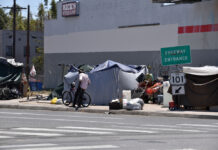In a new comment published in Lancet Public Health, public health experts consider the effects of the coronavirus and COVID-19 on the homeless population in North America. The authors, Jack Tsai and Michal Wilson of the University of Texas, point to the unique vulnerability of these populations, given the lack of access to hygiene measures that might help curb the spread. Additionally, these populations often live in congregate living settings, which further increase the chance of contagion.
“People experiencing homelessness are a vulnerable group, and their potential exposure to COID-19 might negatively affect their ability to be housed, and their mental and physical health,” they write.
 A large number of people in the United States and Canada, especially the cities, face the reality of homelessness. Homeless people are more vulnerable to abuse, even in places like hospitals that are meant to protect them. This lack of power leaves them exposed to coercion. For example, past research has documented the deliberate recruitment of homeless people into dangerous pharmaceutical drug trials.
A large number of people in the United States and Canada, especially the cities, face the reality of homelessness. Homeless people are more vulnerable to abuse, even in places like hospitals that are meant to protect them. This lack of power leaves them exposed to coercion. For example, past research has documented the deliberate recruitment of homeless people into dangerous pharmaceutical drug trials.
The homeless population in the United States regularly faces systemic discrimination, as evidenced in policies allowing them to be committed against their will and laws that seek to punish the destitute for their homeless status. People with a ‘mental illness’ diagnosis often become homeless, and many report that their diagnosis makes them a target of discrimination and disrespect. In addition, those who intend to help the homeless are also often targeted and punished.
Research suggests that severe mental distress and homelessness have a reciprocal and cyclic relationship, and people who are unhoused and diagnosed with a ‘mental disorder’ are more likely to be met with mandates that treat them like criminals. Past research has also shown that community-centric healthcare models operating in shelters are likely to help the homeless and reduce the cost to hospitals. Additionally, some cities have taken steps like opening walk-in care centers to provide housing and care for people in mental distress who are homeless.
In this comment, Tsai and Wilson note that the homeless population in the United States is over 500,000, and in Canada, around 35,000 people experience homelessness on a given night. The authors suggest that the formal (shelters) and informal (abandoned buildings) congregate living settings, and lack of hygiene supplies, makes this group uniquely exposed to the coronavirus disease.
The homeless population’s lack of access to healthcare, accompanying mental and physical health problems, continually mobile lifestyle, and increased chances of substance abuse all lead to higher chances of contracting the virus as well. Further, these same factors make treating, tracking, and quarantining homeless people who contract the virus difficult and problematic.
The authors suggest that it is essential that homeless care providers and street outreach programs are taught to recognize the symptoms of coronavirus disease and be given testing kits for administration. Homeless people are also especially vulnerable to city lockdowns, where public spaces are closed for use. Currently, there are few provisions and spaces made available for the homeless during the coronavirus pandemic. If shelters are locked down, it might further aggravate the physical and mental health of the homeless. They write:
“In such a scenario, closures of shelters and other high-density communal settings (e.g., drop-in centers and soup kitchens) are possible, which could increase the number of unsheltered people experiencing homelessness and reduce their access to needed services.”
As emergency lockdowns use homeless shelters to quarantine patients, the homeless are further displaced and put at risk of contagion. The authors suggest that if cities do not take immediate steps to help the homeless, the spread of coronavirus disease and homelessness are likely going to make each other worse.
****
Tsai, J. & Wilson, M. (2010). COVID-19: a potential public health problem for homeless populations. Lancet Public Health. Published online March 11, 2020. https://doi.org/10.1016/S2468-2667(20)30053-0 (Link)















Where are you going to sleep tonight? Most people (so far) don’t give it a second thought … I’m quite certain the “policy makers” don’t.
Report comment
I remember reading a book of reports by some Senior National Socialist party members as the ‘delousing’ program began to reduce the numbers of workers available to the German State during the war. It is difficult to describe how those reports were viewed with some knowledge of the what happened AFTER they were written. They seemed somehow ‘cold hearted’ in the manner in which the effect on peoples lives were ignored, but the effect on the ‘war effort’ was paramount. Not unexpected I guess if you can put yourself in the boots of some of these Senior State officials.
I get a similar feeling about these types of reports. We basically don’t care what you do with them, but don’t let it have an effect on the bottom line.
Report comment
Dr. Dhar’s review of “The Lancet” article on homeless people and so-called “COVID-19” raises the bar here at MiA. The extensive use here of embedded links back to past MiA articles on homelessness, health, mental health, drugs&pharmaceuticals, Society, etc., also raises the bar for MiA as a whole. I’m FAR MORE IMPRESSED with Dr. Dhar’s review than I am sure that I will be when I actually read the whole “The Lancet” article. I know what kind of idiot doctors write for “The Lancet”, and there’s no guarantee that “The Lancet” hasn’t used, in whole or in part, GHOST WRITERS for their article here. I meet with, work with, eat with, visit, at “home”, shelter, or community, homeless people EVERY DAY. I’ve spent years homeless myself. I’m a survivor of the pharmaceutical psychiatric genocide myself. Yeah, I know what I’m talking about here. And “person experiencing homelessness” is the MOST RIDICULOUS NONSENSE, linguistically, and conceptually, that’s going around these days. It’s almost to the same level of ridiculous nonsense as the Chinese coronavirus they named COVID-19, which as everybody knows was either released from, or escaped from, the Chinese Communist Government Army BIO-WEAPON Lab in Wuhan China. I prefer to remain an infectious carrier of hope, optimism, smiles and laughter, and spread immunity to negativity, pessimism, frowns, fear, and anger. Thank-you, Dr. Dhar, for joining me! KEEP UP the GOOD WORK, people!
Report comment
I do a kind of informal volunteer work with people out on the streets in Canada (as well as underemployed people who have homes) and I’m so upset about the fact we can have a state of emergency declared over corona, but none over there being so many people with nowhere to live.
We have a major ongoing escalating housing crisis all over the world, and it should have been addressed long ago.
Report comment
How absolutely astute and of course common sense.
Every single person in developed cold countries should have a safe bed for the night and a warm meal.
Every single person should have a safe place to say exactly what they need or want to share.
I drive down a parkway, and see the hugest homes possible. I have never desired a huge home, because I actually feel imprisoned, it feels clinical and each time I see the wealth being hoarded in wasted spaces, I think of those that have the space and blanket that they borrow.
But I do know enough about the human spirit that joy might belong to neither the vast owned terrain, or the squater’s spot.
Thanks for helping.
Report comment
Thanks sam. I feel like helping people out is kind of a personal obligation, where feasible. I think people being on the street has become so normalized a lot of people stop registering it as an emergency. I was always willing to help, when I saw people, but it hit me in the last few years that if you found someone say lying on the ground who looked hurt who didn’t appear to be without somewhere to live, and you wouldn’t just leave them, why are so many people just walking by if they are homeless (or appear to be)? I mean it’s understandable if they haven’t the means to help, but I’ve always believed that if someone’s on the streets and they speak to you you should at least answer them, say something kind. I’ve also known some people who were out there too, actually know a guy a little who is right now. Getting worried about him as they’ve now shut the usual places he goes, and I don’t know if I’d be able to track down where he is now.
And about the large homes…I hear you about how they can feel clinical. I used to live with people who owned a huge home. To be honest after doing that there is only one large house I’d ever really deeply desire to live in and it’s one that has a personal significance to me. The trouble with large homes aside from the wasted space and the cost to heat/cool them, is the amount of work you have to do to run them. The one I used to live in was so big it could take a full day to vacuum basically. So honestly, when I see a lot of them I’m usually thinking mostly about all the time they would take to clean!
Report comment